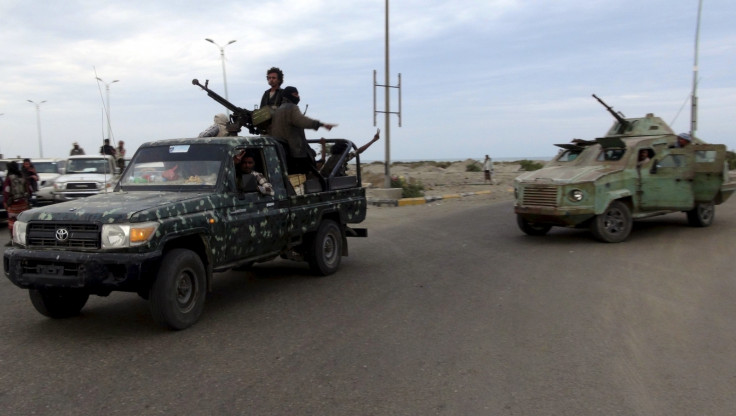Yemen 'poised to split' as experts warn of Iran-Saudi Arabia proxy war

In his apartment in downtown Sana'a, Yemeni businessman and commentator Haykal Bafana has grown used to fielding concerned calls from his mother-in-law overseas.
"The reports tend to be more dramatic to the reality on the ground," he says nonchalantly, over a crackling phone line from Yemen.
"I am still here with my wife and children in Sana'a and the situation largely remains calm."
With the exception of last week's double suicide bombing, Bafana told IBTimes UK, life for people in Sana'a has been relatively peaceful since the takeover of the city by northern Houthi rebels last year.
The invasion caused Yemeni President Abd-Rabbu Mansour Hadi to flee and take up residence in Aden, and this week has seen his forces face off against the Houthis at key points along the border between what was north and south Yemen before the country unified in 1990.
"It has been a drastic change simply because the government institutions, for example the police, have completely disappeared. In its place came the Houthi militia men [who] generally have managed to keep the peace, at least until last week's mosque bombing," he said.
Nobody else appears to be calm, however. After the Houthi seized the town of Taiz, Yemen's third city which is 390km from Sana'a, Jamal Benomar, acting UN special envoy to Yemen, said in a video message from Doha that the country was on the brink of civil war.
"It would be an illusion to think that the Houthis could mount an offensive and succeed in taking control of the entire country. It would be equally false to think that President Hadi could assemble sufficient forces to liberate the country from the Houthis," he said.
"Any side that would want to push the country in either direction would be inviting a protracted conflict in the vein of an Iraq-Libya-Syria combined scenario," he added.
By talking of sides, Benomar was alluding to the involvement of powerful players Saudi Arabia and Iran, who are backing the government forces of president Hadi and the Houthi rebels respectively. There are plenty who see the conflict as a proxy war between Iran and the Saudis, with reports of arms being shipped to the Houthi from Tehran.
On Tuesday, Saudi Arabia's Foreign Minister Prince Saud al Faisal criticised Iran's alleged support to the Houthi Shiite groups and suggested that the Sunni country could back the government forces against the mostly-northern Houthi rebels.
"We are against Iran's intervention in Yemen ... it is actually an act of aggression. We are keen on protecting Yemen's sovereignty, the legitimacy of Yemen represented by President Hadi. We hope that the crisis can be resolved peacefully and we are ready to respond to any demand that the president requests, whatever it is to support him," he said.
Robert McFadden, at the Soufan Group, said the conflict is "undoubtedly" being stoked by Iran and Saudi Arabia and that such sectarian tensions were unusual in Yemen, which has long been divided along tribal lines rather than the Sunni-Shia divide seen in countries of the Levant.
"It has made a transition from a political battlefield into something that is extremely sectarian," he said.
In Aden there are fears that the split between north and south is irreparable and that the Houthis will continue to push south into government controlled areas.
"I think that all indications prove that the country is pushing toward split," Murad Abdu, a journalist and youth activist, told IBTimes UK over the phone from Aden.
The Shia rebels versus Sunni government troops has raised the spectre of sectarian fighting similar to that being seen in Iraq, where Iranian backed militias are fighting Islamic State forces in Tikrit and surrounding villages.
But Bafana, a Sunni, does not buy that analysis. He disputes that Yemen has the same kind of extreme ideologies on either side and that despite the presence of Al Qaeda in the Arabian Peninsula (AQAP) in Yemen, the country was not Iraq. The Houthis, he believes, will seek to consolidate their power but will not risk invading the south.
"The latest fear is that the Houthis are planning to invade the south of Yemen, but I think that this is quite far-fetched. I doubt they would enter what was southern Yemen territory. It looks like their intent is to complete their control over what was formerly northern Yemen," he said.
Bafana believes that on all sides except that of President Hadi there is a desire for a federal Yemen.
For his part, McFaden hopes that that Bafana's analysis turns out to be correct.
"I would hope and pray that he has it right, as at least an accord in that sense - where the fighting would go no further - would be an optimistic outlook," said Soufan's McFadden.
In its defence, McFadden argues that the Houthis and their leader, Abdel Malik al Houthi, publicly stated that it did not want to control the country and only took over Sana'a and other territories as it felt that Hadi's government was failing to restart oil production and affectively fight AQAP. He refers to the Houthi takeover of Sana'a as "the reluctant coup".
But at the same time, in taking Taiz, the Houthis have already pushed further than anyone expected.
"I find it remarkable that a few weeks ago we were saying Aden would always remain with the south, but [not the Houthis] are probing [...] that far," he said.
© Copyright IBTimes 2025. All rights reserved.






















